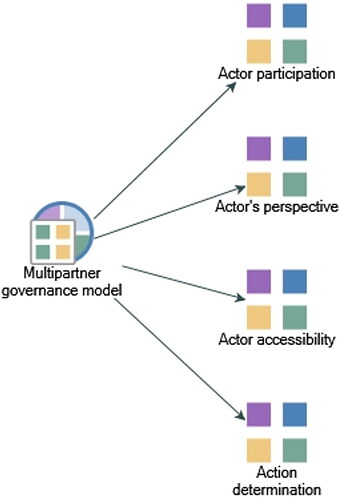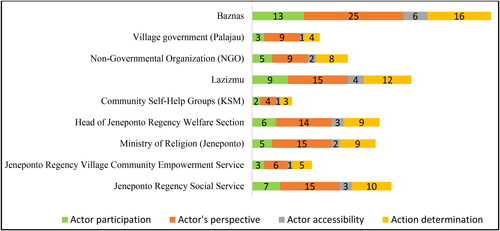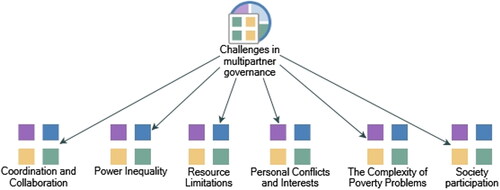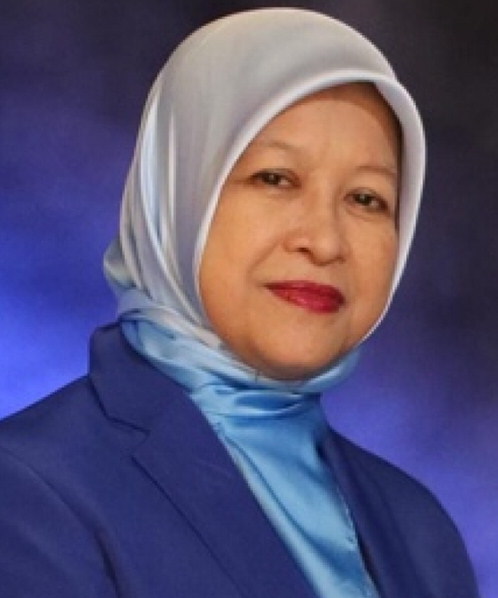Abstract
The problem of poverty still affects many countries and people worldwide, including Indonesia, especially in Jeneponto Regency. This study discusses the multi-partner governance model in managing the fundraising of Zakat funds to alleviate poverty. This model involves various institutions and actors to optimize the collection and use of Zakat funds to help those in need. This study analyzed indicators of actor participation, actor perspectives, actor accessibility, and determination of action to measure each institution’s and actor’s contribution to the multi-partner governance model. The analysis results show that the actor’s perspective dominates with the highest score, showing a strong interest in poverty alleviation. However, challenges in this model were also identified, including effective coordination and collaboration, power imbalances, limited resources, conflicts, personal interests, the complexity of the problem of poverty, and community participation. To overcome these challenges, this study recommends solutions such as building a suitable coordination mechanism, achieving a fair balance of power, increasing the allocation and management of resources, managing conflict and self-interest, adopting a holistic approach to overcoming the complexity of the problem of poverty, and building a mechanism for community participation that is effective.
IMPACT STATEMENT
Multipartner governance in raising Zakat funds is essential in reducing poverty in Jeneponto. This model involves various institutions and actors to optimize Zakat funds’ collection and use with all parties’ active participation. However, challenges such as coordination, power imbalances, and the complexity of poverty problems must be addressed. By integrating policy recommendations and practical steps, including government support and increasing transformer capacity, this model can increase the efficiency and impact of Zakat fund collection to achieve sustainable poverty.
REVIEWING EDITOR:
1. Introduction
Poverty is a serious challenge faced by many countries worldwide, including Indonesia (Liu et al., Citation2020; Nugroho et al., Citation2021). The problem of poverty is very impactful and detrimental to individuals, families, and society (Brisson et al., Citation2020). Poverty alleviation is a moral obligation that must be maximized (Motilal, Citation2019). Everyone has the right to live with dignity and adequate access to basic needs such as food, clean water, housing, education, and health care (Tavares & Betti, Citation2021). Reducing poverty is essential to respecting human rights and striving for social justice. When individuals and families live in conditions of extreme poverty, they tend to be limited in terms of education, access to the labor market, and economic opportunities. By reducing poverty, we can create a more productive, innovative, and competitive society, which in turn can promote sustainable economic growth (Si et al., Citation2020).
The problem of poverty requires a response from many parties, especially the government. Moreover, tackling poverty is complex and requires multiple stakeholders’ collaborative efforts, including governments, the private sector, non-governmental organizations, and civil society (Chang et al., Citation2021; Ullah et al., Citation2021). Through wise policies, appropriate resource allocation, solid social protection programs, and inclusive economic empowerment, it is possible to realize the vision of a world free from poverty and more just for all (Barua, Citation2020; Jeyacheya & Hampton, Citation2020; Rahman, Citation2021). In general, efforts to overcome poverty are also carried out through social assistance programs, increasing access to education, building infrastructure and essential services, economic opportunities, social protection systems, and sustainable development policies. In addition to these efforts, the government can involve community participation, advocate pro-poverty policies, and work with international organizations and donor agencies to address poverty comprehensively (Hoe et al., Citation2018).
One other effort to alleviate poverty is raising Zakat funds. Zakat is an obligation for Muslims who can give some of their wealth to needy individuals. The categorization of Zakat recipients includes several groups that have been determined in Islam, such as individuals experiencing poverty (who do not have enough assets to meet their basic needs), Mustahik (people who are entitled to receive Zakat due to difficult financial conditions), Mu’allaf (people who have just entered Islam), Gharimin (people who have debts that must be paid), Fi Sabilillah (for the benefit of religion and the Islamic struggle), and Ibn Sabil (people who are stuck on a journey and need help) (Ahmad et al., Citation2015; Darsono et al., Citation2019). The urgency lies in carrying out social and religious obligations, namely helping those in need so that they can live a more decent life and strengthening ties of social solidarity in society (Aini, Citation2016; Alim, Citation2015; Allamah et al., Citation2021; Hudaefi et al., Citation2022).
Zakat funds can be collected and managed by Zakat amil institutions appointed by the government or trusted Zakat organizations. Raising Zakat funds has several benefits in alleviating poverty. Zakat allows people to participate directly in helping those in need. Zakat funds can be used effectively to meet the basic needs of people experiencing poverty. These funds can provide cash assistance, food provision, access to education, housing, health services, or assistance in building micro businesses (Hudaefi et al., Citation2022; Manurung, Citation2014; Mujiatun, Citation2018). In many cases, this argument has also been proven that Zakat funds can be used for the entities mentioned above. Several examples of the use of Zakat in Indonesia, supported by evidence from relevant sources, can be mapped.
First, many Amil Zakat Institutions (LAZ) are registered in Indonesia, such as Dompet Dhuafa, BAZNAS (National Amil Zakat Agency), and others. These institutions officially collect Zakat from the public and publish annual reports showing the funds they received and how they were used. This is concrete evidence of using Zakat to help those in need (Anwar & Syarifuddin, Citation2021; Jahar, Citation2015). Second, various LAZs and foundations in Indonesia organize educational programs funded by Zakat funds. An example is a scholarship program for children from underprivileged families (Uddin et al., Citation2020). Third, LAZ also often involves itself in economic empowerment programs funded by Zakat. LAZ provides small business capital assistance to needy individuals or groups (Hassan & Noor, Citation2015). Fourth, LAZ also often provides health and emergency assistance to those in need (Lessy et al., Citation2020). All this evidence describes the use of Zakat in Indonesia to help those needing Islamic principles. This can help poor individuals and families escape poverty and improve their welfare (Rahman, Citation2017).
Efforts to eradicate poverty also require the involvement of many parties. In this situation, a multi-partner governance approach is needed. A collaborative governance approach like this is increasingly recognized as a valuable approach in various domains in solving poverty problems (Lawelai & Nurmandi, Citation2023; Tando et al., Citation2020; Zhang et al., Citation2020). Multi-partner governance, or governance involving many parties, is an approach that recognizes that poverty alleviation and community development require cooperation between various stakeholders, including government, the private sector, non-governmental organizations (NGOs), civil society, and the broad community. This approach encourages cross-sector collaboration to design and implement more holistic and sustainable policies, programs, and projects. In this case, the parties involved can contribute their knowledge, resources, and skills to poverty alleviation (Lawelai & Nurmandi, Citation2023; Liu & Wang, Citation2023; Zhang et al., Citation2020).
There have been many studies that specifically analyze the topic of poverty, as well as studies that discuss Zakat funds. However, very little research has been found that examines both simultaneously, especially the idea of multi-partner governance. The minimal number of studies that combine analyses of poverty, Zakat funds, and the idea of multi-partner governance is due to the complexity of the interactions between these three elements and the methodological challenges inherent in integrating these different aspects in one study. Additionally, a more traditional research focus may tend to separate the analysis of poverty and Zakat, thereby reducing attention to the potential positive impacts of a multi-partner governance approach.
Although there are still minimal study results that specifically discuss these three issues, there is still some previous literature that is considered relevant to provide a helpful framework and insight in the context of this research, thereby enabling a deeper understanding of the potential for Zakat integration in multi-partner governance for overcome poverty. First, overcoming poverty is an essential goal in sustainable development. This involves improving access and equity to education, health, housing, and decent employment (Hörisch, Citation2021; Opoku et al., Citation2018). Second, fundraising Zakat funds refers to collecting funds from individuals, companies, or organizations to accommodate social problems, such as poverty (Owoyemi, Citation2020). Third, the urgency of multi-partner governance lies in the importance of involving different stakeholders in the decision-making and management of a particular entity or project. In this context, multi-partner governance provides an opportunity for governments, the private sector, non-governmental organizations, academia, and civil society to work collaboratively (Emerson et al., Citation2012; Emerson & Nabatchi, Citation2015; Espada & Sobrinho, Citation2019; Vélez et al., Citation2022).
This study aims to fill the gaps in previous research by analyzing issues related to poverty alleviation, Zakat fundraising, and multi-partner governance simultaneously. This research question is described as follows. (a) How does the multi-partner governance model accommodate poverty alleviation efforts through Zakat fundraising in Jeneponto Regency? (b) What are the results of evaluating the role of actors involved in multi-partner governance to reduce poverty by fundraising Zakat funds in Jeneponto Regency? (c) What are the challenges in multi-partner governance related to poverty alleviation efforts through Zakat fundraising in Jeneponto Regency? The answers to these three questions make it possible to know how the multi-partner governance model accommodates every poverty alleviation effort through fundraising Zakat funds, including its evaluation and challenges. The results of this research can be an alternative, as well as valuable lessons for stakeholders to support poverty alleviation in the future by maximizing the fundraising of Zakat funds.
2. Method
The research method used in this research is a qualitative approach with thematic analysis. This approach is used to understand and describe experiences, views, and meanings related to managing Zakat fundraising in the context of multi-partner governance and the urgency of poverty alleviation. The researcher chose this case study because Jeneponto is the district with the highest percentage of poor people in South Sulawesi, Indonesia. The data sources used in this research are the results of interviews with various relevant stakeholders, such as the government, community, and private sector. Government actors include the Jeneponto Regency Social Service, the Jeneponto Regency Village Community Empowerment Service, and the Village Government in Jeneponto Regency. Community actors include Non-Governmental Organization Groups and the Family Welfare Empowerment Team, while private actors include Baznas, Lazismu, and Non-Governmental Organizations.
The sampling strategy in this study involved a purposive sampling approach, which was chosen to ensure that the various stakeholders involved in multi-partner governance in Jeneponto Regency were adequately represented. The selection of informants was carried out deliberately based on their relevance and role in regional governance. The Jeneponto Regency Social Service, the Village Community Empowerment Service, and the local Village Government represent the government. Community groups include Non-Governmental Organizations and the Family Welfare Empowerment Team, while the private sector includes Baznas, Lazismu, and various Non-Governmental Organizations. This approach allows comprehensive and representative data collection, including diverse perspectives from each group actively participating in regional governance, thereby strengthening the validity of research results.
In this research, interviews were conducted using in-depth interview techniques. Interview conducted in 2022. The interview began with selecting informants from various stakeholders related to the management of Zakat funds, as previously mentioned. This research then approached the informants and scheduled interviews. During the interview, the researcher followed an interview guide prepared previously and focused on managing Zakat fundraising, multi-partner governance, and the urgency of poverty alleviation. Interview data was recorded, transcription was carried out carefully, and the information obtained was analyzed to identify patterns and themes relevant to this research. In this research, the primary ethical considerations are obtaining informed consent from all respondents before interviews, ensuring the confidentiality of data disclosed by respondents, and ensuring that research results are used only for legitimate research purposes while maintaining the integrity and reputation of all stakeholders involved so that increasing transparency and enabling ethical replication of research.
The thematic analysis flow in this research begins with the data collection stage through interviews with the various stakeholders mentioned above. Once the data is collected, the first step is to transcribe the interviews and import the data into Nvivo 12 Plus software. This analytical tool will help in organizing and compiling the resulting data. Next, the imported data will be analyzed by identifying emerging patterns, such as central themes, views, and meanings relevant to managing Zakat fundraising in the context of multi-partner governance and the urgency of poverty alleviation. Data will be grouped and arranged based on the themes that have been identified, allowing researchers to understand the perspectives and critical aspects that emerge from the interview results in more depth. The results of this thematic analysis will be the basis for compiling the findings and conclusions in this research, providing a more comprehensive understanding of the role of multi-partner governance in managing Zakat funds to alleviate poverty.
The qualitative research methodology in this study allows researchers to overcome specific challenges in understanding the complexity of multi-partner governance in the management of Zakat funds and the urgency of poverty alleviation in Jeneponto Regency. Through in-depth interviews, researchers explored and captured diverse perspectives from various stakeholders, such as government, communities, and the private sector, who have different views and experiences in this context. This approach helps identify common themes and patterns from each party’s interactions and contributions, providing deep insight into the dynamics and challenges. Interview data organized and analyzed using Nvivo 12 Plus software allows researchers to systematically identify and group essential themes, such as multi-partner governance models, the role of actors in multi-partner governance, and challenges in multi-partner governance. These findings are then used to develop policy and practical recommendations.
3. Results and discussion
3.1. Multipartner governance model: Accommodating poverty alleviation efforts through fundraising Zakat funds
The multi-partner governance model and the fundraising of Zakat funds are two approaches that can complement each other in poverty alleviation efforts. Multipartner governance, or multi-partner governance, refers to collaboration between governments, the private sector, civil society organizations, and other institutions to achieve sustainable development goals (Emerson et al., Citation2012; Vélez et al., Citation2022). Meanwhile, fundraising Zakat funds is an effort to collect funds from individuals, companies, and organizations to help those in need through Zakat (Owoyemi, Citation2020). The multi-partner governance model provides opportunities for various stakeholders to contribute to poverty alleviation efforts. Collaboration between the government, the private sector, and civil society organizations can create synergies that increase the efficiency and effectiveness of implementing poverty alleviation programs. In this context, Zakat fundraising can also be a significant funding source.
The multi-partner governance model that is maximized to accommodate poverty alleviation efforts through Zakat fundraising in Jeneponto Regency is described as follows:
Actor participation in the context of the multi-partner governance model refers to the involvement of various stakeholders with different roles and interests in the decision-making process and policy implementation (Gadeka et al., Citation2023; Ominde & Ochieng, Citation2020). The government, the private sector, civil society organizations, academics, and other community groups can participate in dialogue, collaboration, and cooperation to achieve the same goal: poverty alleviation. The actor’s perspective refers to each stakeholder’s views, values, and knowledge. Each actor has a unique understanding of the problem of poverty, possible solutions, and the role that must be played in poverty alleviation efforts. Understanding the perspectives of these different actors is essential in establishing practical cooperation and reaching mutually beneficial agreements.
Actor accessibility relates to the availability and opportunities for all stakeholders to participate in multi-partner governance processes (Change et al., Citation2014; Gadeka et al., Citation2023). Openness, transparency, and inclusive mechanisms will ensure that the actors involved can contribute pretty and equally (Brown, Citation2002). It is essential to ensure that there are no unfair barriers to accessing information, resources, and opportunities for participation. Action determination is a process whereby the actors involved in multi-partner governance jointly determine the concrete steps to achieve the goal of poverty alleviation. Each actor can contribute through collaborative efforts, allocating resources, implementing programs, and evaluating results (Davidson et al., Citation2019). This process involves negotiation, division of responsibilities, and coordination among the actors involved.
In poverty alleviation, actor participation, actor perspective, actor accessibility, and determination of effective action are essential factors in the success of the multi-partner governance model. By involving various stakeholders, respecting their perspectives and knowledge, ensuring fair access, and determining results-oriented actions, we can increase the effectiveness and impact of poverty alleviation efforts. The actors involved and contributing to accommodating poverty alleviation efforts through Zakat fundraising in Jeneponto Regency with a multi-partner governance approach are described as follows:
shows four indicators used to evaluate the role of actors in the multi-partner governance model in collecting Zakat funds: actor participation, perspective, accessibility, and action determination. Based on , the actor perspective variable dominates with a total score of 112. In contrast, other variables, such as actor participation, actor accessibility, and action determination, get a total score of 53, 23, and 76, respectively. When looking at the total scores of all institutions from indicators actor perspective, Jeneponto district Baznas achieved a score of 60. In addition, Palajau village scored 17, Village Community Empowerment Service (PMD) 15, Jeneponto district social service 35, ministry of Religion 31, community welfare sector 32, Village Self-Help Group (KSM) Palajau 10, Lazismu Jeneponto district 40, and Non-Governmental Organization (NGO) Pattiro Jeka scored 24.
Figure 1. The multipartner governance model.
Source: Processed by researchers using Nvivo 12 Plus from interview data sources, 2022.

Figure 2. Results of evaluating the role of actors in multipartner governance to reduce poverty by fundraising Zakat funds.
Source: Processed by researchers using Nvivo 12 Plus from interview data sources, 2022.

From these data, the Jeneponto district BAZNAS plays a good role in the multi-partner governance model in collecting Zakat funds. This is evident from the total score obtained, namely 60, which is higher than other institutions. The results of this analysis indicate that the Jeneponto district BAZNAS has active participation, a strong perspective, good accessibility, and the ability to determine practical actions in collecting Zakat funds. In addition to the excellent role shown by Baznas Jeneponto district in the multi-partner governance model in collecting Zakat funds, several other institutions also get pretty high scores. The Jeneponto district social service and the Ministry of Religion have demonstrated significant involvement and contribution to the Zakat fundraising process.
The contribution of the Jeneponto district Baznas and other institutions in the multi-partner governance model in collecting Zakat funds may vary depending on the roles and responsibilities of each institution. Jeneponto district Baznas coordinates and manages to collect Zakat funds at the district level and encourages active participation from the community for Zakat through effective and transparent programs. Evaluate and distribute Zakat funds to eligible beneficiaries. We are ensuring the accessibility of actors by providing accessible and open access for the public to tithe and submit requests for assistance. Determine appropriate actions to increase the effectiveness of the collection and distribution of Zakat funds.
The Jeneponto Regency Social Service also plays a role in identifying and validating potential Zakat beneficiaries. Facilitate the implementation of social programs funded by Zakat funds and provide guidance and assistance to Zakat beneficiaries to make good use of the assistance. In addition, the Jeneponto Regency Social Service also monitors and evaluates social programs that use Zakat funds. On the other hand, the Ministry of Religion of Jeneponto Regency also provides guidance and supervision for collecting and managing Zakat funds, encouraging public awareness about the importance of Zakat and its benefits for society at large, including providing education and training to the public regarding good Zakat management. Not only that, but the Ministry of Religion of Jeneponto Regency also continues to coordinate with Baznas and other related institutions to optimize the collection and distribution of Zakat funds.
The head of the Community Welfare Division of Jeneponto Regency also provides data and information about social conditions and community welfare which are used as a reference in determining Zakat beneficiaries. Participate in programs that aim to improve people’s welfare through Zakat funds. Supervise the implementation of welfare programs funded by Zakat funds and ensure the benefits are on target. As for Lazismu, Jeneponto Regency also collects Zakat funds through various programs and activities carried out by Lazismu. In addition, distribute Zakat funds to beneficiaries who need them and continue to build cooperation with BAZNAS and other institutions to increase the effectiveness of the collection and distribution of Zakat funds.
Non-Governmental Organizations (NGOs) advocate the importance of transparent and accountable collection and distribution of Zakat funds. Provide monitoring and evaluation of the collection and management of Zakat funds by related institutions and provide input and recommendations for improvement and improvement of the multi-partner governance model in collecting Zakat funds. The contribution of each of these institutions aims to achieve a more effective, transparent collection and distribution of Zakat funds and provide maximum benefits for people in need. With collaboration between these institutions, it is hoped that good synergy will occur to improve social welfare and reduce poverty in Jeneponto Regency through collecting and distributing Zakat funds.
3.2. Challenges in multipartner governance related to poverty alleviation efforts
This study found several challenges faced in the multi-partner governance model related to poverty alleviation efforts, including coordination and collaboration, power imbalances, limited resources, conflicts, personal interests, the complexity of poverty issues, and community participation ().
Figure 3. Challenges in multi-partner governance related to poverty alleviation efforts.
Source: Processed by researchers using Nvivo 12 Plus from interview data sources, 2022.

This study also found several challenges in multi-partner governance related to poverty alleviation efforts in Jeneponto Regency. This study highlights coordination and collaboration issues. In this context, coordination can be complicated due to differences in approaches, policies, and objectives between government, society, and the private sector. Likewise, synergistic collaboration is also a challenge, as problems often arise, such as more effective communication and differences in vision between stakeholders. One of the informants (FG) also emphasized the following:
We also often face difficulties coordinating with other institutions managing Zakat funds. They have different approaches, and it is sometimes difficult to reach agreement on how funds should be allocated. (Interview 2022).
In some cases, the role and power of large institutions in managing Zakat dominates decisions, so we, as a community or small party, feel we have less say in the process. (Interview 2022).
We want to provide more significant assistance to needy families, but our Zakat funds are limited. Sometimes, we must choose who gets help, which is problematic. (Interview 2022).
Sometimes, we compete with other institutions to obtain Zakat funds from donors. This competition can result in disharmony between institutions and slow down program implementation. (Interview 2022).
Another challenge in efforts to overcome poverty in Jeneponto Regency is the complexity of the problem, which involves economic, social, educational, and health aspects. Apart from that, minimal community participation in the decision-making process and program implementation is also an obstacle to achieving transparency and success of Zakat programs. This was acknowledged by an informant who highlighted the complexity of the poverty problem, which requires a holistic approach and more active community participation in efforts to eradicate poverty in the region. Apart from that, public participation also adds to the problem in efforts to eradicate poverty in Jeneponto Regency. Some of the challenges above were also confirmed by an informant (AJ) as follows.
The problem of poverty in Jeneponto Regency is very complex. Many families need help with money and their children’s education, access to good healthcare, and decent job opportunities. This is also complicated because communities are often not involved in program decision-making, planning, implementation, and monitoring processes. (Interview 2022).
Another challenge faced in efforts to overcome poverty in Jeneponto Regency is the complexity of the poverty problem itself. For example, the problem of poverty found in this study is not only limited to economic aspects but also involves social, educational, and health factors. For example, families living in poverty may also face limited access to quality education services, limited access to adequate health services, and a lack of opportunities for decent work. Apart from these problems, another challenge that complements the findings in this study is the minimal level of public participation in Jeneponto Regency. Low participation from the community in planning, implementing, and monitoring Zakat programs also hinders these programs’ transparency, accountability, and success.
The complexity of poverty problems in Jeneponto Regency is a significant obstacle in coordination and collaboration efforts to eradicate poverty. This condition includes various interrelated economic, social, educational, and health aspects. Effective coordination and collaboration are complex because they require a deep understanding of every aspect involved and the complex integration of cross-sector solutions. In addition, the lack of community participation in the decision-making process and program implementation also adds to the complexity of poverty alleviation efforts. With this limited involvement, it is challenging to implement the proposed solutions and programs to truly reflect the needs and aspirations of communities affected by poverty.
Several challenges in multi-partner governance related to poverty alleviation efforts in Jeneponto Regency have also become common problems other researchers encounter in various cases. In coordination and collaboration, several other studies show that problems like this occur because multi-partner governance involves many parties with different interests and goals. Differences in approaches, priorities, and policies also hinder the achievement of optimal synergy (Akhtar-Schuster et al., Citation2011). One of the complex aspects is the different approaches to understanding the root causes of poverty and how best to overcome them. Government institutions have policies and programs that are more structural, focusing on changes in policies and systems that create social and economic inequality (Lascoumes & Gales, Citation2007). On the other hand, civil society organizations and non-governmental organizations are more oriented towards community-based approaches, focusing on direct community empowerment and poverty alleviation (Keijzer & Bossuyt, Citation2020).
Regarding coordination and collaboration, policy differences can also hinder achieving synergy. The institutions and actors involved may have different policy frameworks, leading to conflicts and inconsistencies in implementing poverty alleviation programs. To address this challenge, it is essential to establish effective coordination mechanisms and facilitate open dialogue between all parties involved. A good coordination process must involve understanding and respecting the differences in existing approaches, priorities, and policies (Bachynsky, Citation2020). It is also essential to establish a common understanding of the goals to be achieved and identify mutually beneficial areas of cooperation. With close cooperation, good communication, and strong commitment from all parties involved, multi-partner governance can effectively address poverty holistically and sustainably.
The results of other studies also confirm that the challenges in poverty alleviation are caused by an imbalance of power between the institutions and actors involved (Hovardas, Citation2021; Wegner & Verschoore, Citation2022). Institutions with greater power or access to resources may inadvertently or intentionally dominate decision-making and resource allocation processes, resulting in injustice and disparities in poverty alleviation efforts. This power imbalance can appear in various forms, such as differences in institutional capacity, access to information and knowledge, and control over resources (Casciaro & Piskorski, Citation2005; O’Brien & Evans, Citation2017). Institutions with dominant power may use their position to influence agendas and decisions, ignoring the needs and aspirations of weaker parties.
It is essential to ensure a balance of power in multi-partner governance. This can be done by promoting democratic principles, active participation, and inclusion in decision-making. All parties involved must have equal access to relevant information and resources to participate actively in decision-making. In addition, it is essential to build mechanisms that facilitate open dialogue, transparency, and accountability (Clune & O’Dwyer, Citation2020; Unerman & Bennett, Citation2004). Realizing a balance of power requires a strong commitment from all parties involved, including government institutions, civil society organizations, the private sector, and society. Building an inclusive, transparent, and multi-partner governance environment can be an effective tool in overcoming power imbalances and achieving more just and sustainable results in poverty alleviation efforts.
One of the other challenges in poverty alleviation with a multi-partner governance approach is the limited available resources. Multipartner governance requires adequate funds, workforce, infrastructure, and capacity to run programs that reduce poverty effectively (Adogamhe, Citation2010). However, the reality is that available resources are often limited, especially in areas facing widespread poverty (Commins, Citation2004). More resources can affect various aspects of poverty alleviation programs. For example, programs that aim to provide financial assistance to low-income families may be limited in reach and scope if available funds are limited. Training and economic empowerment programs may also be difficult to implement widely if a trained workforce and necessary infrastructure are insufficient.
In addition, limited resources can also affect the capacity of institutions involved in multi-partner governance. Government institutions, civil society organizations, and the private sector need adequate resources to plan, implement and monitor poverty alleviation programs. A lack of resources can hinder their ability to implement these programs effectively. To address this challenge, concerted efforts are needed to optimize available resources and seek additional resources. In addition, limited resources also emphasize the importance of clear priorities in poverty alleviation. This can involve increasing efficiency, trimming redundant bureaucracy, and seeking funding from multiple sources, including government funds, donor agencies, and the private sector (Etim & Daramola, Citation2020). In addition, it is essential to develop institutional capacity and upgrade the workforce’s skills involved in poverty reduction to maximize the returns from available resources.
In multi-partner governance, conflicts and personal interests are challenges that often arise. When various institutions and actors are involved, differences in individual or group interests can hinder joint efforts to eradicate poverty. Specific political, economic, or social interests can affect the dynamics of decision-making and resource allocation, reducing the effectiveness of poverty alleviation programs (Bellandi et al., Citation2021; Cabral et al., Citation2019). Conflicts of interest can appear in various forms, both overt and covert. Institutions or actors with greater power or access may try to advance their agendas or gain private benefits rather than prioritize the public interest in poverty alleviation. In addition, competition and conflicting interests between actors can disrupt harmonious collaboration and hinder achieving common goals.
To overcome this challenge, building an effective conflict resolution mechanism in the context of multi-partner governance is essential. Such mechanisms include open and transparent dialogue to discuss differences of opinion and dispute resolution through negotiation, mediation, or other appropriate mechanisms. Promoting integrity, accountability, and transparency is essential so that self-interest cannot dominate the decision-making process. In addition, it is essential to ensure that the public interest is placed above private interests. The principles underlying poverty alleviation, such as social justice, equality, and humanity, must guide decision-making and resource allocation. The institutions and actors involved must have a solid commitment to prioritize the interests of people affected by poverty and work together to achieve broader and more sustainable outcomes (Idike et al., Citation2021; Schröder et al., Citation2020).
Poverty is a complex problem that a narrow approach cannot solve. Another challenge in poverty alleviation is understanding and dealing with the complexities inherent in this phenomenon. Poverty has various dimensions: economic, social, educational, health, and environmental. In addition, the causes of poverty also come from various factors, such as economic inequality, lack of access to education and health services, conflict, climate change, and policies that are not inclusive (Bruton et al., Citation2021; Hope, Citation2020; Rasheed et al., Citation2021). To overcome this challenge, a holistic approach to poverty alleviation is needed. This approach comprehensively involves various sectors and dimensions of poverty (Amofah & Agyare, Citation2022). The institutions and actors involved must work together to integrate policies and programs in various sectors, such as economic empowerment, education, health, infrastructure, and social protection. We can only comprehensively identify and address the root causes of poverty by adopting a holistic approach.
Community participation is also crucial to poverty alleviation (Ndaguba & Hanyane, Citation2019). Involving communities actively and inclusively in the planning, implementing, and evaluating poverty alleviation programs provides significant benefits. However, challenges may arise in involving vulnerable and marginalized communities in decision-making. Several groups in society, such as women, persons with disabilities, the poor, and ethnic minorities, often face obstacles in obtaining equal access to information, resources, and opportunities for participation (Bezyak et al., Citation2020; Shih et al., Citation2019). It is essential to create effective participation mechanisms which provide equal opportunities for all groups of people to participate in the decision-making and management of poverty alleviation programs. These mechanisms can involve participatory forums, cross-sectoral dialogues, discussion groups, or public consultations. It is also essential to ensure that communities have adequate access to relevant information and the capacities and skills to participate effectively.
To overcome the challenges of the multi-partner governance model related to poverty alleviation efforts in Jeneponto Regency, several solutions are needed, including building effective coordination mechanisms and strong collaboration between the institutions and actors involved. This involves a clear division of responsibilities, open communication, and fair exchange of information. There must be an effort to balance power fairly between the institutions and actors involved. This can be done by ensuring inclusive participation in decision-making, encouraging transparency and accountability, and strengthening the role of monitoring and conflict resolution institutions. In addition, efforts are needed to increase the effectiveness of resource allocation and management to overcome resource limitations. This includes seeking sustainable funding, developing human capacity, and utilizing technology and innovation to optimize existing resources.
On the other hand, it is essential to manage conflicts and overcome personal interests that can hinder cooperation in alleviating poverty in the Jeneponto Regency. This involves diplomacy, dialogue, effective conflict resolution mechanisms, and enforcing rules and policies that support the public interest. In dealing with the complexity of poverty problems, a holistic approach is needed that involves various sectors and dimensions of poverty. This includes integrating policies, programs, and interventions in various sectors such as the economy, education, health, and environment. It is necessary to build effective participation mechanisms and community capacity to increase community participation. This involves increasing access to information, education, and training and empowering communities to participate in decision-making and implementing poverty alleviation programs. Through these solutions, the multi-partner governance model can overcome the challenges faced in efforts to eradicate poverty and achieve better results in reducing social disparities and improving the welfare of vulnerable communities.
3.3. A policy and practical recommendation for multipartner governance in Zakat fund collection and poverty alleviation
Based on findings from Jeneponto Regency, the multi-partner governance model in collecting Zakat funds and alleviating poverty involves four core components: actor participation, actor perspective, actor accessibility, and action determination. Actor participation involves various stakeholders in decision-making and policy implementation, including government entities, the private sector, civil society organizations, and communities. This inclusive approach ensures that diverse perspectives and expertise contribute to a more comprehensive and effective poverty reduction strategy. The actor perspective emphasizes the importance of recognizing and integrating each stakeholder’s unique views, values, and knowledge, encouraging mutual understanding and respect, which is critical to collaborative efforts.
Actor accessibility refers to creating transparent and inclusive mechanisms that enable all stakeholders to participate fairly in the governance process. This includes ensuring open access to information, resources, and participation opportunities, thereby removing barriers that may exclude certain groups. Determination of action involves collaborative planning and implementation of concrete steps towards poverty alleviation, with stakeholders negotiating responsibilities, coordinating efforts, and evaluating results collectively. Overcoming challenges such as coordination and collaboration difficulties, power imbalances, limited resources, and conflicts of interest requires establishing effective communication channels, balancing power dynamics, optimizing resource allocation, and developing holistic and participatory approaches. By integrating these components, a multi-partner governance model can increase the efficiency and impact of Zakat fund collection efforts, ultimately contributing to more sustainable poverty alleviation.
Policy recommendations for multi-partner governance in Zakat fund collection and poverty alleviation should emphasize the importance of establishing a coordination forum that involves various stakeholders. The government must facilitate this forum by providing supportive regulations and an effective communication platform. With a coordination forum, various entities such as the government, private sector, civil society organizations, and communities can collaborate in formulating policies, determining priorities, and evaluating results periodically. The government must also ensure that existing regulations support fair and transparent access to information and resources so that all stakeholders can participate effectively. In addition, policies that encourage recognition and integration of each actor’s unique perspectives and knowledge are essential to create more comprehensive and sustainable solutions for poverty alleviation.
Practically, implementing this multipartner governance model requires concrete steps to overcome the challenges of coordination and collaboration in the field. Providing training and capacity building for stakeholders to improve their ability to communicate, negotiate, and collaborate is an essential first step. In addition, establishing a participatory monitoring and evaluation system allows stakeholders to measure program success and make necessary adjustments collectively. Optimizing resource allocation holistically is essential to overcome resource limitations and reduce power imbalances. Thus, this model will increase the efficiency of Zakat fund collection and ensure that the funds are used in a targeted manner, contributing to more sustainable and equitable poverty alleviation across communities.
In addition, policymakers also need to adopt regulations that facilitate cross-sector collaboration by developing incentive policies, as in Malaysia, where Zakat payments function as annual income tax deductions. Malaysia uses Zakat as a tax deduction, provided that the zakat is paid at an official government institution (Destiana & Hamzah, Citation2021). This step can encourage greater participation from the private sector and society in collecting Zakat funds. In addition, policymakers should focus on simplifying administrative procedures to increase actors’ accessibility to information and resources and ensure that monitoring and evaluation mechanisms are carried out transparently and inclusive. On the other hand, practitioners need to implement training programs that increase collaboration and communication capacity between stakeholders, as well as build participatory monitoring and evaluation systems to assess program effectiveness on an ongoing basis. Through this approach, poverty alleviation efforts can be more effective and positively impact the long term by overcoming challenges such as coordination difficulties, power imbalances, and limited resources.
4. Conclusion
Multipartner governance in managing the fundraising of Zakat funds has quite a crucial urgency in alleviating poverty in Jeneponto Regency. Involving various institutions and actors, this model can optimize the collection and ies, use of Zakat funds to help that in need. Through the active participation of all part including government agencies, community organizations, and individuals, efforts to eradicate poverty can be carried out holistically and effectively. In this context, analysis of indicators such as actor participation, actor perspective, actor accessibility, and determination of action helps measure the involvement and contribution of each institution and actor to poverty alleviation goals. However, to achieve optimal results, challenges such as coordination and collaboration, power imbalances, limited resources, conflicts, personal interests, the complexity of the problem of poverty, and community participation need to be addressed appropriately. An effective mechanism is needed to manage conflict, ensure a balance of power, optimize the use of resources, and build active and inclusive community participation.
By integrating policy recommendations and practical steps that emphasize the importance of participation, perspective, accessibility, and action determination in a multi-partner governance model, efforts to collect Zakat funds and reduce poverty can be significantly improved. The government must facilitate cross-sector coordination forums, support regulations that ensure transparent access to information, and develop incentive policies such as tax cuts for Zakat payments. On the other hand, practitioners must focus on training, increasing collaboration capacity, and implementing participatory monitoring and evaluation systems. Thus, this model increases the efficiency of collecting Zakat funds and ensures their use is targeted, contributing to more sustainable and equitable poverty alleviation across communities.
The limitations of this research lie in its focus on findings from Jeneponto Regency, which need to cover the diversity of regional contexts in Indonesia and fully reflect the dynamics in other countries. Additionally, in exploring policy and practical recommendations, more in-depth studies may be needed to assess the effectiveness of particular measures in various contexts. Therefore, further research involving diverse local contexts and empirical testing of proposed policy recommendations can help refine and expand understanding of multi-partner governance models in poverty alleviation. To improve understanding of the multi-partner governance model in poverty alleviation, future research needs to expand the geographic scope and conduct empirical testing of the proposed policy recommendations.
Disclosure statement
No potential conflict of interest was reported by the author(s).
Additional information
Notes on contributors

Nuryanti Mustari
Nuryanti Mustari, a lecturer and researcher at the Faculty of Social and Political Sciences, Muhammadiyah University of Makassar, Indonesia. Interested in current research on public policy, political economy, and governance.

Rosdianti Razak
Rosdianti Razak, a lecturer and researcher at the Faculty of Social and Political Sciences, Muhammadiyah University of Makassar, Indonesia. Interested in current research on state administration and government management.

J. Junaedi
J. Junaedi, a lecturer and researcher at the Faculty of Social and Political Sciences, Muhammadiyah University of Makassar, Indonesia. Interested in current research on public administration.

F. Fatmawati
F. Fatmawati, a lecturer and researcher at the Faculty of Social and Political Sciences, Muhammadiyah University of Makassar, Indonesia. Interested in current research on environmental governance.

Hardianto Hawing
Hardianto Hawing, a lecturer and researcher at the Faculty of Social and Political Sciences, Muhammadiyah University of Makassar, Indonesia. Interested in current research on environmental politics.

Tawakkal Baharuddin
Tawakkal Baharuddin, a lecturer and researcher at the Faculty of Social and Political Sciences, Muhammadiyah University of Makassar, Indonesia. Interested in current research in social and political issues.
References
- Adogamhe, P. G. (2010). Economic policy reform & poverty alleviation: A critique of Nigeria’s strategic plan for poverty reduction. Poverty & Public Policy, 2(4), 1–16. https://doi.org/10.2202/1944-2858.1125
- Ahmad, R. A. R., Othman, A. M. A., & Salleh, M. S. (2015). Assessing the satisfaction level of Zakat Recipients towards zakat management. Procedia Economics and Finance, 31(15), 140–151. https://doi.org/10.1016/s2212-5671(15)01141-7
- Aini, Q. (2016). The urgency of zakat and waqf management for improving community welfare. Journal of Zakat and Waqf, 1(2), 1–25.
- Akhtar-Schuster, M., Thomas, R. J., Stringer, L. C., Chasek, P., & Seely, M. (2011). Improving the enabling environment to combat land degradation: Institutional, financial, legal and science-policy challenges and solutions. Land Degradation & Development, 22(2), 299–312. https://doi.org/10.1002/ldr.1058
- Alim, M. N. (2015). Utilization and accounting of Zakat for Productive Purposes in Indonesia: A review. Procedia – Social and Behavioral Sciences, 211(September), 232–236. https://doi.org/10.1016/j.sbspro.2015.11.028
- Allamah, R., Sudiarti, S., & Saputra, J. (2021). The Role of Zakat, Infaq, Shadaqah and Waqf in Empowering the Ummat Economy. Al-Sharf: Jurnal Ekonomi Islam., 2(1), 35–46.
- Amofah, S., & Agyare, L. (2022). Poverty alleviation approaches of development NGOs in Ghana: Application of the basic needs approach. Cogent Social Sciences, 8(1), 2063472. https://doi.org/10.1080/23311886.2022.2063472
- Anwar, N., & Syarifuddin, S. (2021). Women’s empowerment with islamic philanthropy model: A Case study of STF Dompet Dhuafa Program in South Sulawesi. Journal of Islamic Economics Lariba, 7, 135–144. https://doi.org/10.20885/jielariba.vol7.iss2.art5
- Bachynsky, N. (2020). Implications for policy: The Triple Aim, Quadruple Aim, and interprofessional collaboration. Nursing Forum, 55(1), 54–64. https://doi.org/10.1111/nuf.12382
- Barua, S. (2020). Financing sustainable development goals: A review of challenges and mitigation strategies. Business Strategy & Development, 3(3), 277–293. https://doi.org/10.1002/bsd2.94
- Bellandi, M., Donati, L., & Cataneo, A. (2021). Social innovation governance and the role of universities: Cases of quadruple helix partnerships in Italy. Technological Forecasting and Social Change, 164, 120518. https://doi.org/10.1016/j.techfore.2020.120518
- Bezyak, J. L., Sabella, S., Hammel, J., McDonald, K., Jones, R. A., & Barton, D. (2020). Community participation and public transportation barriers experienced by people with disabilities. Disability and Rehabilitation, 42(23), 3275–3283. https://doi.org/10.1080/09638288.2019.1590469
- Brisson, D., McCune, S., Wilson, J. H., Speer, S. R., McCrae, J. S., & Hoops Calhoun, K. (2020). A systematic review of the association between poverty and biomarkers of toxic stress. Journal of Evidence-Based Social Work, 17(6), 696–713. https://doi.org/10.1080/26408066.2020.1769786
- Brown, W. A. (2002). The prevalence of inclusive governance practices in nonprofit organizations and implications for practice. Nonprofit Management and Leadership, 12(4), 369–385. https://doi.org/10.1002/nml.12404
- Bruton, G., Sutter, C., & Lenz, A. K. (2021). Economic inequality – Is entrepreneurship the cause or the solution? A review and research agenda for emerging economies. Journal of Business Venturing, 36(3), 106095. https://doi.org/10.1016/j.jbusvent.2021.106095
- Cabral, S., Mahoney, J. T., McGahan, A. M., & Potoski, M. (2019). Value creation and value appropriation in public and nonprofit organizations. Strategic Management Journal, 40(4), 465–475. https://doi.org/10.1002/smj.3008
- Casciaro, T., & Piskorski, M. J. (2005). Power imbalance, mutual dependence, and constraint absorption: A closer look at resource dependence theory. Administrative Science Quarterly, 50(2), 167–199. https://doi.org/10.2189/asqu.2005.50.2.167
- Chang, Y., He, W., & Wang, J. (2021). Government initiated corporate social responsibility activities: Evidence from a Poverty Alleviation Campaign in China. Journal of Business Ethics, 173(4), 661–685. https://doi.org/10.1007/s10551-020-04538-w
- Change, G. E., Number, L., Environmental, G., Journal, C., By-Nc-Nd, C. C., & Change, G. E. (2014). Effectiveness and synergies of policy instruments for land use governance in tropical regions. Global Environmental Change, 28(4), 129–140. https://doi.org/10.1016/j.gloenvcha.2014.06.007
- Clune, C., & O’Dwyer, B. (2020). Organizing dissonance through institutional work: The embedding of social and environmental accountability in an investment field. Accounting, Organizations and Society, 85, 101130. https://doi.org/10.1016/j.aos.2020.101130
- Commins, P. (2004). Poverty and social exclusion in rural areas: Characteristics, processes and research issues. Sociologia Ruralis, 44(1), 60–75. https://doi.org/10.1111/j.1467-9523.2004.00262.x
- Darsono, S. N. A. C., Raihana, M., Jati, H. F., & Pachmi, A. (2019). The impact of productive Zakat on the Income Inequality of Mustahiq in Yogyakarta. Journal of Economics Research and Social Sciences, 3(1), 56–71. https://doi.org/10.18196/jerss.030107
- Davidson, K., Coenen, L., Acuto, M., & Gleeson, B. (2019). Reconfiguring urban governance in an age of rising city networks: A research agenda. Urban Studies, 56(16), 3540–3555. https://doi.org/10.1177/0042098018816010
- Destiana, A. R., & Hamzah, M. Z. (2021). Fiscal policy design in Malaysia and Indonesia about Zakat and Taxes. Indonesian Conference of Zakat Proceedings, 2021, 463–470. https://doi.org/10.37706/iconz.2021.345
- Emerson, K., & Nabatchi, T. (2015). Evaluating the productivity of collaborative governance regimes: A performance matrix. Public Performance & Management Review, 38(4), 717–747. https://doi.org/10.1080/15309576.2015.1031016
- Emerson, K., Nabatchi, T., & Balogh, S. (2012). An integrative framework for collaborative governance. Journal of Public Administration Research and Theory, 22(1), 1–29. https://doi.org/10.1093/jopart/mur011
- Espada, A. L. V., & Sobrinho, M. V. (2019). Logging community-based forests in the Amazon: An analysis of external influences, multi-partner governance, and resilience. Forests, 10(6), 461. https://doi.org/10.3390/f10060461
- Etim, E., & Daramola, O. (2020). The informal sector and economic growth of South Africa and Nigeria: A comparative systematic review. Journal of Open Innovation, 6(4), 134. https://doi.org/10.3390/joitmc6040134
- Gadeka, D. D., Akweongo, P., Whyle, E., Aryeetey, G. C., Aheto, J. M., & Gilson, L. (2023). Role of actor networks in primary health care implementation in low- and middle-income countries: a scoping review. Global Health Action, 16(1), 2206684. https://doi.org/10.1080/16549716.2023.2206684
- Hassan, N. M., & Noor, A. H. M. (2015). Do capital assistance programs by Zakat institutions help the poor? Procedia Economics and Finance, 31(15), 551–562. https://doi.org/10.1016/s2212-5671(15)01201-0
- Hoe, K. C., Abd Wahab, H., Bakar, S. H. A., & Islam, M. R. (2018). Community participation for rural poverty alleviation: A case of the Iban community in Malaysia. International Social Work, 61(4), 518–536. https://doi.org/10.1177/0020872816673890
- Hope, K. R. (2020). Peace, justice and inclusive institutions: Overcoming challenges to the implementation of Sustainable Development Goal 16. Global Change, Peace and Security, 32(1), 57–77. https://doi.org/10.1080/14781158.2019.1667320
- Hörisch, J. (2021). The relation of COVID-19 to the UN sustainable development goals: implications for sustainability accounting, management and policy research. Sustainability Accounting, Management and Policy Journal, 12(5), 877–888. https://doi.org/10.1108/SAMPJ-08-2020-0277
- Hovardas, T. (2021). Social sustainability as social learning: Insights from multi-stakeholder environmental governance. Sustainability, 13(14), 7744. https://doi.org/10.3390/su13147744
- Hudaefi, F. A., Caraka, R. E., & Wahid, H. (2022). Zakat administration in times of COVID-19 pandemic in Indonesia: A knowledge discovery via text mining. International Journal of Islamic and Middle Eastern Finance and Management, 15(2), 271–286. https://doi.org/10.1108/IMEFM-05-2020-0250
- Idike, A. N., Ukeje, I. O., Ogbulu, U., Aloh, J. N., Obasi, V. U., Nwachukwu, K., Osuebi, K., & Ejem, E. N. (2021). The practice of human capital development process and poverty reduction: Consequences for sustainable development goals in Ebonyi State, Nigeria. Public Organization Review, 21(2), 263–280. https://doi.org/10.1007/s11115-020-00482-5
- Jahar, A. S. (2015). Marketing Islam through Zakat Institutions in Indonesia. Studia Islamika, 22(3), 405–442. https://doi.org/10.15408/sdi.v22i3.2353
- Jeyacheya, J., & Hampton, M. P. (2020). Wishful thinking or wise policy? Theorising tourism-led inclusive growth: Supply chains and host communities. World Development, 131, 104960. https://doi.org/10.1016/j.worlddev.2020.104960
- Keijzer, N., & Bossuyt, F. (2020). Partnership on paper, pragmatism on the ground: The European Union’s engagement with civil society organisations. Development in Practice, 30(6), 784–794. https://doi.org/10.1080/09614524.2020.1801589
- Lascoumes, P., & Gales, P. L. E. (2007). Introduction: Understanding public policy through its instruments – From the nature of instruments to the sociology of public policy instrumentation. Governance, 20(1), 1–21. https://doi.org/10.1111/j.1468-0491.2007.00342.x
- Lawelai, H., & Nurmandi, A. (2023). The model of collaborative governance in addressing poverty in Indonesia. Jurnal Ranah Publik Indonesia Kontemporer, 2(2), 195–206. https://doi.org/10.47134/rapik.v2i2.27
- Lessy, Z., Adamek, M., & Khaja, K. (2020). Philanthropic zakat for the disadvantaged: Recipient perspectives from Indonesia. Asian Social Work and Policy Review, 14(3), 138–147. https://doi.org/10.1111/aswp.12204
- Liu, L., & Wang, Y. (2023). How street-level bureaucrats collaborate for policy entrepreneurship: Insights from anti-poverty policy implementation in China. Administration & Society, 55(9), 1791–1818. https://doi.org/10.1177/00953997231187082
- Liu, M., Feng, X., Wang, S., & Qiu, H. (2020). China’s poverty alleviation over the last 40 years: successes and challenges. Australian Journal of Agricultural and Resource Economics, 64(1), 209–228. https://doi.org/10.1111/1467-8489.12353
- Manurung, S. (2014). Islamic religiosity and development of Zakat Institution. Qudus International Journal of Islamic Studies, 1(2), 197–220. https://doi.org/10.21043/QIJIS.V1I2.186
- Motilal, S. (2019). Eradicating poverty: The mission, vision and conviction. Journal of Indian Council of Philosophical Research, 36(3), 431–445. https://doi.org/10.1007/s40961-019-00183-5
- Mujiatun, S. (2018). Model of professional Zakat Management in Indonesia. International Journal of Economics, Business and Management Research, 2(4), 80–90.
- Ndaguba, E. A., & Hanyane, B. (2019). Stakeholder model for community economic development in alleviating poverty in municipalities in South Africa. Journal of Public Affairs, 19(1), 1–11. https://doi.org/10.1002/pa.1858
- Nugroho, A., Amir, H., Maududy, I., & Marlina, I. (2021). Poverty eradication programs in Indonesia: Progress, challenges and reforms. Journal of Policy Modeling, 43(6), 1204–1224. https://doi.org/10.1016/j.jpolmod.2021.05.002
- O’Brien, N. F., & Evans, S. K. (2017). Civil society partnerships: Power imbalance and mutual dependence in NGO partnerships. International Journal of Voluntary and Nonprofit Organizations, 28(4), 1399–1421. https://doi.org/10.1007/s11266-016-9721-4
- Ominde, D., & Ochieng, E. (2020). Managing multi-partner collaborations on major infrastructure projects. In Routledge handbook of planning and management of global strategic infrastructure projects (1st ed., p. 17). Routledge. https://doi.org/10.4324/9781003036388-7
- Opoku, Maxwell P., Swabey, Karen, Pullen, Darren, Dowden, Tony, J-F, (2018). Poverty alleviation among persons with disabilities via United Nations’ sustainable development goals in Ghana: Voices of stakeholders with disabilities. Sustainable Development, 27(1), 175–182. https://doi.org/10.1002/sd.1899
- Owoyemi, M. Y. (2020). Zakat management the crisis of confidence in zakat agencies and Journal of Islamic Accounting and Business Research, 11(2), 498–510. https://doi.org/10.1108/JIABR-07-2017-0097
- Rahman, M. M. (2021). Achieving sustainable development goals of Agenda 2030 in Bangladesh: The crossroad of the governance and performance. Public Administration and Policy, 24(2), 195–211. https://doi.org/10.1108/PAP-12-2020-0056
- Rahman, R. (2017). The request and the gift in religious and humanitarian endeavors. In The Request and the gift in religious and humanitarian endeavors (pp. 145–170). Palgrave Macmillan. https://doi.org/10.1007/978-3-319-54244-7
- Rasheed, R., Rizwan, A., Javed, H., Sharif, F., & Zaidi, A. (2021). Socio-economic and environmental impacts of COVID-19 pandemic in Pakistan – An integrated analysis. Environmental Science and Pollution Research, 28(16), 19926–19943. https://doi.org/10.1007/s11356-020-12070-7
- Schröder, P., Lemille, A., & Desmond, P. (2020). Making the circular economy work for human development. Resources, Conservation and Recycling, 156, 104686. https://doi.org/10.1016/j.resconrec.2020.104686
- Shih, K. Y., Chang, T. F., & Chen, S. Y. (2019). Impacts of the Model Minority Myth on Asian American Individuals and Families: Social justice and critical race feminist perspectives. Journal of Family Theory & Review, 11(3), 412–428. https://doi.org/10.1111/jftr.12342
- Si, S., Ahlstrom, D., Wei, J., & Cullen, J. (2020). Business, entrepreneurship and innovation toward poverty reduction. Entrepreneurship & Regional Development, 32(1-2), 1–20. https://doi.org/10.1080/08985626.2019.1640485
- Tando, C. E., Sudarmo., & Haryanti, R. H. (2020). Collaborative governance in overcoming poverty problems in surakarta: A literature review. In 3rd International Conference on Social Transformation, Community, and Sustainable Development (ICSTCSD 2019), 389(Icstcsd 2019), 55–59. https://doi.org/10.2991/icstcsd-19.2020.11
- Tavares, F. F., & Betti, G. (2021). The pandemic of poverty, vulnerability, and COVID-19: Evidence from a fuzzy multidimensional analysis of deprivations in Brazil. World Development, 139, 105307. https://doi.org/10.1016/j.worlddev.2020.105307
- Uddin, J., Misbach, I., & Wahab, A. (2020). The distribution of Zakat Mal Based on Al-’Adl in order to improve the welfare of the Mustahiqs in The Laznas of Baitul Mal Hidayatullah South Sulawesi. Al-Ulum, 20(1), 233–251. https://doi.org/10.30603/au.v20i1.1146
- Ullah, A., Kui, Z., Ullah, S., Pinglu, C., & Khan, S. (2021). Sustainable utilization of financial and institutional resources in reducing income inequality and poverty. Sustainability, 13(3), 1038. https://doi.org/10.3390/su13031038
- Unerman, J., & Bennett, M. (2004). Increased stakeholder dialogue and the internet: Towards greater corporate accountability or reinforcing capitalist hegemony? Accounting, Organizations and Society, 29(7), 685–707. https://doi.org/10.1016/j.aos.2003.10.009
- Vélez, M. L., Sánchez, J. M., & Araújo, P. (2022). Multipartner alliances among small firms promoted by external managers: Risk and governance mechanisms. International Small Business Journal: Researching Entrepreneurship, 41(4), 401–431. https://doi.org/10.1177/02662426221100182
- Wegner, D., & Verschoore, J. (2022). Network governance in action: Functions and practices to foster collaborative environments. Administration & Society, 54(3), 479–499. https://doi.org/10.1177/00953997211024580
- Zhang, N., Zhang, X., Lei, M., & Yang, Y. (2020). Multiagent collaborative governance for targeted poverty alleviation from the perspective of stakeholders. Complexity, 2020, 1–21. https://doi.org/10.1155/2020/8276392
